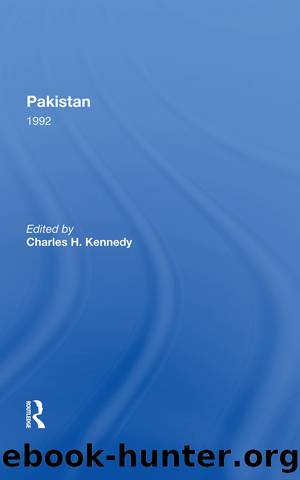Pakistan 1992 by Charles H. Kennedy

Author:Charles H. Kennedy [Kennedy, Charles H.]
Language: eng
Format: epub
Tags: Social Science, Political Science, World, Asian, Regional Studies, General
ISBN: 9780813383491
Google: mK2bDwAAQBAJ
Goodreads: 2937482
Publisher: Westview Press
Published: 1992-12-14T00:00:00+00:00
Yunani Tibb
Yunani- or Islami-Tibb, based on ancient Greek formulations, primarily of Galen, is generally categorized as yet another form of religious medicine. Soon after the inception and spread of Islam, the medical system was translated into Arabic by scholars at the Bayt-al·Hikmat in Baghdad and subsequently resystematized and developed by a number of prominent Muslim scholar-physicians, notably Ibn Sina (Avicenna). Initially the entire medical system was suspected of contradicting Islam, for life is said to depend upon a vital force (rooh) which operates independently of the physical body. Ironically, it is precisely this feature that is stressed by those who now promote the medical system in Pakistan: that something other than the strictly material ground of life as postulated by rational science is recognized as the basis for life.
Based on an analogy with the separation of blood into four types of substances when heated in a crucible, four humors (blood, phlegm, yellow bile, and black bile) consisting of four primary substances (earth, air, fire, and water) and characterized by four basic qualities (hot, cold, wet, and dry) are said to constitute the body. In physiology the pattern of quadraplicities persists: food is heated (or matured or cocted) four times, in the stomach, liver, veins, and tissues, and utilized as directed by four essential organs in accordance with primary and secondary faculties, including nutrition (absorption, assimilation, and integration), growth, reproduction, and elimination that are in turn associated with four types of fibers that constitute the tissues.
Each individual has a unique point of balance among the qualities and the humors they represent, and thus a temperament, or mizaj, that is relatively sanguine (relating to blood, hot, and wet), phlegmatic (pertaining to phlegm, cold, and wet), choleric (relating to bile, hot, and dry) or melancholic (pertaining to black bile, cold, and dry). This notion has been extended by advocates of Yunani Tibb to apply to the nation as a whole as in the argument that it is an indigenous, Islamic medicine and therefore the best âsuited to the temperament [sic] of people of7 Pakistan. Similar arguments have been preferred both following the establishment of the nation and during the period of Islamization under Zia when this research was conducted.
Yunani Tibb has long been practiced in Pakistan by older, respected men in their communities through the countryside. Less aggressive in professionalizing than Ayurveda in colonial India,8 two distinct schools of practice, based in Lucknow and Delhi, nonetheless emerged before the creation of Pakistan. The conservative Lucknow practitioners advocated strict adherence to traditional herbal prescriptions and other remedies while those based in Delhi and their followers advocated use of biomedicines to supplement the traditional medications. Discussion of the best of these strategies continues today, crosscutting competing groups of indigenous Pakistani hakims and those who migrated from India in 1947.
Unlike the clinics and hospitals of biomedical practitioners, a typical hakimâs office has a warm, even homey atmosphere. The crowded clinic of a widely famed hakim in Lahore is only roughly segregated between men and women. Examination
Download
This site does not store any files on its server. We only index and link to content provided by other sites. Please contact the content providers to delete copyright contents if any and email us, we'll remove relevant links or contents immediately.
The European Opportunity by Felipe Fernández-Armesto(569)
The European History Highway: A Guide to Internet Resources by Dennis A. Trinkle Scott A. Merriman(535)
Morgan Kaufmann Digital Watermarking and Steganography by Ingemar Cox Matthew Miller Jeffrey Bloom Jessica Fridrich Ton(528)
The Seven Wonders of the Ancient World by Michael Denis Higgins(521)
Hyperculture by Byung-Chul Han(509)
European Security without the Soviet Union by Stuart Croft Phil Williams(506)
European Security in a Global Context by Thierry Tardy(505)
The Routledge companion to Christian ethics by D. Stephen Long Rebekah L. Miles(498)
Get Real with Storytime by Julie Dietzel-Glair & Marianne Crandall Follis(443)
Hudud Al-'Alam 'The Regions of the World' - a Persian Geography 372 A.H. (982 AD) by V. V. Minorsky & C. E. Bosworth(436)
Gorbachev And His Generals by William C. Green(429)
Tibetan Studies in Comparative Perspective by Chih-yu Shih Yu-Wen Chen(427)
Governance, Growth and Global Leadership by Espen Moe(418)
How Languages Are Learned 5th Edition by Patsy M Lightbown;Nina Spada; & Nina Spada(407)
CliffsNotes on Fitzgerald's The Great Gatsby by Kate Maurer(400)
The Oxford History of the World by Fernández-Armesto Felipe;(388)
The Egyptian Economy, 1952-2000 by Khalid Ikram(379)
Oral Poetry and Narratives from Central Arabia: The Poetry of Ad-Dindan : A Bedouin Bard in Southern Najd (Studies in Arabic Literature, Vol 17) (English and Arabic Edition) by P. M. Kupershoek P. Marcel Kurpershoek(365)
The Oxford Handbook of the Incas by Sonia Alconini(364)
